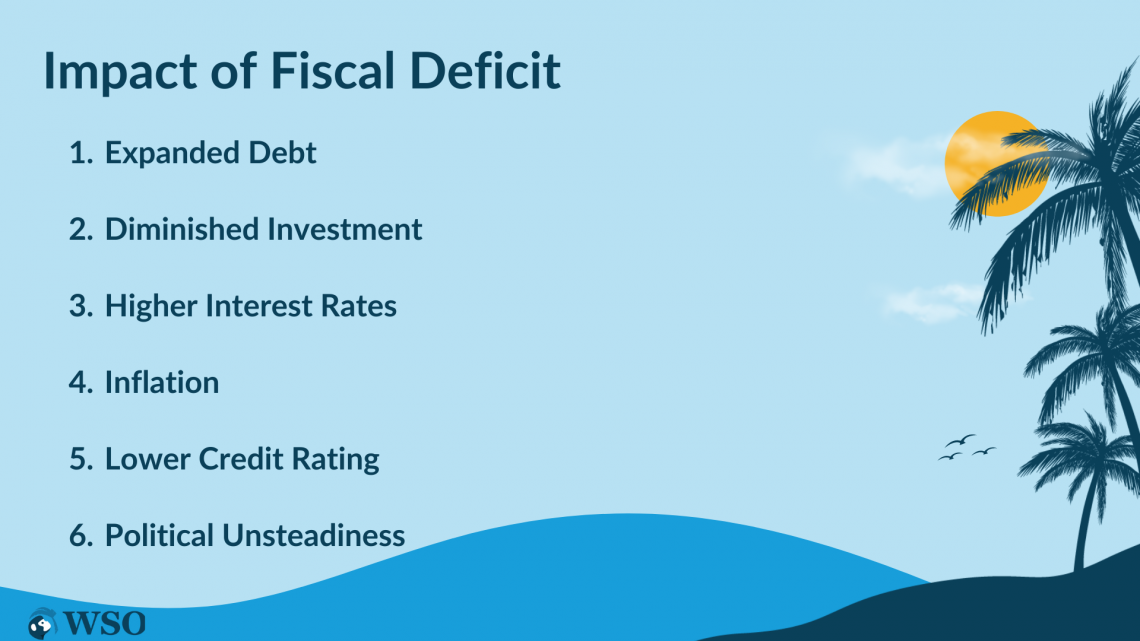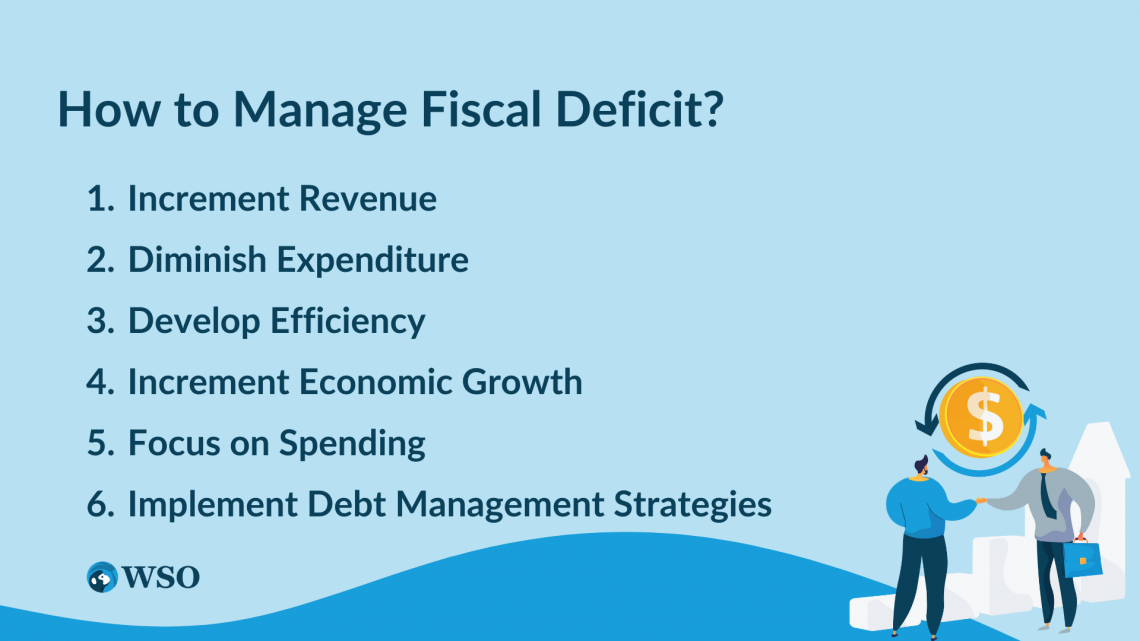Fiscal Deficit
It alludes to the gap between a government's total revenue and expenditure
Fiscal deficit is a significant economic idea often examined corresponding to government spending and taxation. It alludes to the gap between a government's total revenue and expenditure.

It is a significant economic indicator since it estimates a government's capacity to live inside its means and finance its programs and projects.
A government that spends more than it earns should borrow to finance its deficit, which can have long-haul economic consequences.
The idea of this has become especially important lately, as governments all over the planet have expanded spending to battle the economic fallout from the Coronavirus pandemic.
The pandemic has prompted a critical expansion in government spending on social welfare programs, healthcare, and economic stimulus measures.
Simultaneously, the pandemic has likewise prompted a decrease in tax revenues, as organizations have shut down and people have lost their positions.
For instance, the US's fiscal deficit should reach $3 trillion in 2021, up from $984 billion in 2019. Similarly, the United Kingdom's fiscal deficit has to reach £355 billion in 2021, up from £58 billion in 2019.
The expansion has prompted worries about the drawn-out economic consequences of the pandemic.

Numerous economists stress that the upsurge in government borrowing will prompt expansion, higher loan fees, and diminishing investor certainty.
Others contend governments should keep investing in social welfare programs and economic stimulus measures to help their residents and increase economic growth.
Considering these worries, understanding the idea of it and its impact on the economy is significant. Therefore, this article will cover the significance, origins, effects, and methods governments might employ.
By understanding these ideas, perusers will be better prepared to break down the economic impact of government spending and taxation arrangements.
Key Takeaways
- Fiscal deficit refers to the gap between a government's total revenue and its total expenditure, and it is an important indicator of a central authority's capability to manage its finance.
- The COVID-19 pandemic has brought about a massive growth in fiscal deficits globally, as governments have increased spending to fight the monetary fallout while tax revenues have declined.
- Causes of fiscal deficit include economic downturns, excessive military spending, tax rules, social welfare programs, infrastructure spending, and interest bills on debt.
- The impact of economic deficit can include increased debt, decreased investment, high-interest charges, inflation, and political instability.
- Managing fiscal deficit requires a combination of strategies such as growing sales, reducing expenditure, improving efficiency, growing economic boom, prioritizing spending, and imposing debt control techniques.
- Long-term perspectives and careful balancing of immediate needs with destiny priorities are essential in managing fiscal deficit efficiently.
- Transparency and duty play an essential role in coping with the fiscal deficit by supplying accurate financial reviews and constructing trust and confidence in government institutions.
- Political will, commitment, and effective leadership are necessary to make difficult choices and put measures in force to cope with fiscal deficit and ensure long-term economic stability.
Calculation of Fiscal Deficit
Calculating fiscal deficit is a natural cycle contrasting a government's total revenue and expenditure over a period.

It is often computed yearly but may also be calculated monthly or quarterly.
We must first decide the government's total revenue for the given period to calculate it. This incorporates all wellsprings of revenue, like taxes, fees, and other government charges.
For example, a government's total revenue would be $1.5 trillion if it brought in $1 trillion in tax money and $500 billion in other revenue in a given year.
The government's total spending for a comparable time should then be determined. Every dollar the government spends on projects, including programs, services, and infrastructure, is included in this.
For example, if a government spent a similar sum on defense, social welfare, and infrastructure upgrades, its all-out spending would be $1.8 trillion.
It may be determined by deducting the government's expenditures from its total receipts. It is measured using the following formula:
Fiscal Deficit = Total Expenditure - Total Revenue

We deduct the whole revenue from the total expenditure to arrive at the required answer. Per the past model, the government received $1.5 trillion in total pay and burned through $1.8 trillion.
Therefore, its yearly financial plan deficit reached $300 billion ($1.8 trillion short of $1.5 trillion).
It's memorable that it can be either positive or negative, contingent upon whether the government's general expenditures are more than its total revenues or the inverse. Inflation should likewise be considered while calculating it.
NOTE
While a negative fiscal deficit demonstrates that the government is securing more than it is spending, a positive fiscal deficit shows the inverse.
Inflation can increase revenue and expenditure after some time, which can cause it to seem bigger than it is. Accordingly, it is normal to change it for inflation while examining what is happening.
Calculating it is a significant device for dissecting a government's financial well-being and capacity to manage its finances. By understanding how to calculate it, we can more readily comprehend the impact of government spending and taxation arrangements on the economy.
Causes of Fiscal Deficit
A few factors can add to it. But, by and large, it happens when a government's total expenditure exceeds its total revenue. A portion of the vital causes of it includes:

1. Economic downturns
When the economy encounters a recession or a slowdown, tax revenues will more often than not decline as organizations and people procure less pay.
Simultaneously, government spending might increase as additional individuals depend on social welfare programs and economic stimulus measures. This mix can add to it.
2. Military spending
Military spending is among the biggest parts of government expenditure in numerous nations. Moreover, wars, clashes, and security dangers can prompt expanded military spending, which can add to it.
3. Tax policies
Tax policies can fundamentally affect a government's revenue. For instance, if tax rates are excessively low, government revenue might decline, while high tax rates might prompt diminished economic movement and lower tax revenue.
Tax evasion and aversion can likewise decrease government revenue and add to it.
4. Social welfare programs
The expense of maintaining social welfare services, including healthcare, education, and social security, can be high for governments. Moreover, as populaces age and healthcare costs rise, social welfare spending can build, prompting this deficit.
5. Infrastructure spending
Governments might have to invest in infrastructure projects like roads, bridges, and public transportation to support economic growth. However, these projects can be expensive and may add to its cost.
When a government borrows to finance its deficit, it should pay interest on its debt. This is because as debt increases, so do the interest payments, which can add to it.
NOTE
These deficits can emerge from economic, social, and political elements. Understanding its causes is significant for creating powerful strategies to oversee government finances and guarantee long-haul economic solidness.
Impact of Fiscal Deficit
Its impact can be huge and expansive, influencing the government and the more extensive economy. A portion of the critical impacts of it includes:

1. Expanded Debt
It means that a government is spending more than it is procuring, which prompts an expansion in government debt. As the degree of debt increases, so do interest payments, which can further strain the government's finances.
2. Diminished Investment
To address it, governments might be compelled to reduce investment in key regions, like education, infrastructure, and innovative work. This can prompt slower economic growth and diminished seriousness over the long haul.
3. Higher Interest Rates
It can prompt higher interest rates as investors request higher re-visitations of makeup for the expanded gamble of investing in a country with high degrees of debt.
Higher interest rates can make it more challenging for organizations and people to borrow cash, which can dial back economic activity.
4. Inflation
It can sometimes prompt inflation if the government prints cash to finance its spending. This can lessen the worth of the cash and lead to higher costs for labor and products.
A high fiscal deficit can likewise prompt a lower credit rating for a government, making it more costly to borrow cash from now on. A lower credit rating can likewise lessen investor confidence and lead to a further decrease in the worth of the cash.
6. Political Unsteadiness
A high fiscal deficit can prompt political insecurity if it isn't tended to. This can bring about social distress, fights, and even a shift in power in outrageous cases.
Generally, it can have huge economic and social consequences. Therefore, governments should cautiously deal with their finances to guarantee they can meet their commitments and maintain long-term economic strength.
How to manage a Fiscal Deficit?
Managing it requires a blend of present-moment and long-haul strategies that address both the revenue and expenditure sides of government finances.

Here are viable ways of managing it:
1. Increment Revenue
One method for managing it is incrementing government revenue. This should be possible by increasing government rates or presenting new taxes, for example, a value-added tax (VAT).
Governments can likewise consider privatizing state-owned ventures, which can create extra revenue.
2. Diminish Expenditure
Governments can oversee it by decreasing expenditures. Cutting excessive spending, like subsidies or wasteful programs, should be possible.
Governments can consider presenting cost-saving measures, for example, lessening public sector wages, restricting travel costs, or scaling back the government labor force.
3. Develop Efficiency
Working on the efficiency of government spending can assist with managing it.
This should be possible by presenting execution-based planning, smoothing out government obtainment cycles, or utilizing innovation to develop government administration conveyance further.
4. Increment Economic Growth
A solid economy can produce extra revenue for the government and assist with managing it. Governments can consider investing in infrastructure, education, and innovative work to help economic growth.
Empowering foreign investment, advancing products, and diminishing exchange obstructions can help economic growth.
5. Focus On Spending
Focusing on spending can assist with managing it by guaranteeing that assets are coordinated towards high-need regions, like social welfare, education, and healthcare.
Governments can consider acquiring instruments to assess the adequacy of programs and divert assets toward those conveying the best outcomes.
6. Implement Debt Management Strategies.
Governments can likewise oversee it by implementing debt management strategies, for example, debt rebuilding or renegotiating. This can assist with lessening interest payments and further develop the general debt profile.
NOTE
Managing a fiscal deficit requires a mix of present-moment and long-haul strategies that address revenue and expenditure. Governments should cautiously adjust their needs and implement measures to guarantee long-haul economic steadiness.
Fiscal Deficit Conclusion
It is a basic issue for governments worldwide, and its impact on the economy and society can't be disregarded.

While it can prompt expanded debt, decreased investment, higher interest rates, inflation, and political instability, there are viable ways of managing it.
These incorporate expanding revenue, diminishing expenditure, further developing efficiency, expanding economic growth, focusing on spending, and implementing debt management strategies.
Governments must take on a drawn-out viewpoint while managing it.
This requires offsetting immediate necessities with future needs, like investing in education, infrastructure, and innovative work, which can uphold long-haul economic growth and dependability.
NOTE
Governments should likewise cautiously consider its social ramifications and focus on spending in regions that benefit the most vulnerable sections of society.
Transparency and responsibility are additionally basic in managing fiscal deficits. Therefore, governments should guarantee that their financial reports precisely mirror their ongoing financial position and give convenient and dependable data to general society.
This assists work with trust and confidence in government organizations, which is fundamental for viable administration.
At last, managing it requires political will and commitment. Governments should pursue hard decisions, like cutting superfluous spending or increasing government rates, and implement estimates that help long-haul economic dependability.
This requires solid administration, powerful correspondence, and joint effort across political and cultural partitions.
Managing it is perplexing and testing; however, it is fundamental for manageable economic growth and social advancement.
Governments should adopt a comprehensive methodology that tends to revenue and expenditure and offsets immediate necessities with long-haul needs.
This way, they can guarantee that their economies stay steady and prosperous and that their residents enjoy superior personal satisfaction.
Fiscal Deficit FAQs

Transparency and accountability are basic in managing it as they assist with building trust and confidence in government foundations, which is fundamental for successful administration. Governments should guarantee that their financial reports precisely mirror their ongoing financial position and give ideal and solid data to general society.
Expanding economic growth can produce extra revenue for the government and assist with managing it. In addition, governments can invest in infrastructure, education, and innovative work to help economic growth. Empowering foreign investment, advancing products, and lessening exchange barriers can support economic growth.
Focusing on spending can assist with managing it by guaranteeing that assets are coordinated towards high-need regions, like social welfare, education, and healthcare. Governments can acquaint components with assessing the adequacy of programs and divert assets toward those conveying the best outcomes.
A drawn-out perspective is expected for managing it, which requires offsetting immediate necessities with future priorities, like investing in education, infrastructure, and innovative work, which can uphold long-haul economic growth and soundness. Governments should likewise consider its social ramifications and focus on spending in regions that benefit the most vulnerable sections of society.
Political will and commitment are basic in managing it. Governments should go with tough decisions, like cutting pointless spending or increasing government rates, and implement estimates that help long-haul economic soundness. This requires solid administration, successful correspondence, and joint effort across political and cultural partitions.
Researched and authored by Gauri Tanwar | LinkedIn
Reviewed and Edited by Raghav Dharmarajan
Free Resources
To continue learning and advancing your career, check out these additional helpful WSO resources:









or Want to Sign up with your social account?